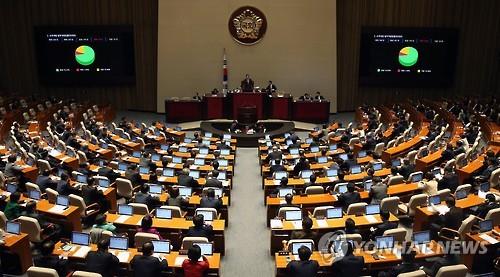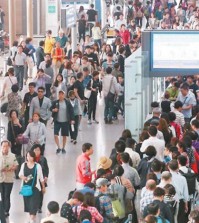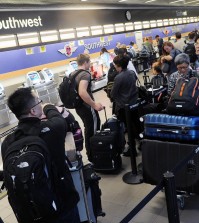- California Assembly OKs highest minimum wage in nation
- S. Korea unveils first graphic cigarette warnings
- US joins with South Korea, Japan in bid to deter North Korea
- LPGA golfer Chun In-gee finally back in action
- S. Korea won’t be top seed in final World Cup qualification round
- US men’s soccer misses 2nd straight Olympics
- US back on track in qualifying with 4-0 win over Guatemala
- High-intensity workout injuries spawn cottage industry
- CDC expands range of Zika mosquitoes into parts of Northeast
- Who knew? ‘The Walking Dead’ is helping families connect
S. Korean parliament passes 2016 budget bill after deadline
SEOUL (Yonhap) — The National Assembly passed the government’s 2016 budget bill during a plenary session Thursday, failing to meet the legal deadline.
The bill calls for increasing the government budget by 2.9 percent to 386.4 trillion won, or about $332 billion, next year from 375.4 trillion won this year.
It falls 300 billion won short of the amount requested by the government in September.
The Constitution obliges the parliament to pass its annual budget bill by Dec. 2 to allow 30 days of preparation for the bill’s implementation.
A main parliamentary session was delayed to Wednesday night after the rival parties failed to narrow their differences on the size of next year’s budget and other contentious bills.
The delay was due to disagreements on two contentious projects that would need heavy government financial support.
The projects were how much government subsidies should be provided for publishing state-authored history textbooks and establishing a special committee on probing the sinking of the Sewol ferry last year.
The government plans to issue national history textbooks for secondary school students starting in the 2017 school year so they can get a “balanced” view of Korean history.
A large chunk of the spending was allocated to health, welfare and labor. About 500 billion won was added to social welfare.
The budget into lunar exploration increased from 10 billion won to 20 billion won. The budget for developing unmanned machines increased from 6 billion won to 20 billion won.
The Assembly is notorious for its end-of-year tug-of-war over the government’s budget, with rival parties often clashing over items that sometimes lead to physical fights as well as sit-ins inside Parliament.
The government-proposed budget bill for 2016 was automatically put to a full-floor vote under new laws after the rival parties failed to complete deliberations of the budget.
Last year, the government’s 2015 budget bill passed through the National Assembly ahead of the legal deadline for the first time in 12 years.
















